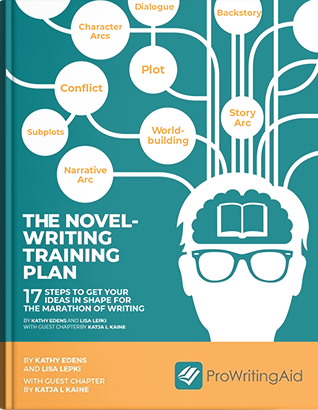
The paradoxical question, "if a tree falls in a wood but no one hears it, did it make a sound?" mirrors an existential problem that some writers face—imposter syndrome.
After all, you can painstakingly spend hours perfecting your manuscript but it may never leave your laptop. Even worse, the snippets you have as notes may never progress into a full body of work.
If no-one ever witnesses your claim to fame, did it really happen?
Imposter syndrome is a hurdle that many writers face, especially those newbies who constantly compare their work to the "professionals." Some writers can’t help but feel like a fraud, even the established ones. There’s always this nagging feeling that their work isn’t good enough and they aren’t deserving of their accomplishments.
What Is Imposter Syndrome?
Psychologists Pauline Rose Clance and Suzanne Imes developed the concept, originally termed "imposter phenomenon," in their 1978 founding study.
Imposter syndrome, also called "perceived fraudulence," involves feelings of self-doubt and personal incompetence that persist despite your education, experience, and accomplishments. (Healthline, 2021)
Succinctly put, imposter syndrome makes you feel like a fraud.
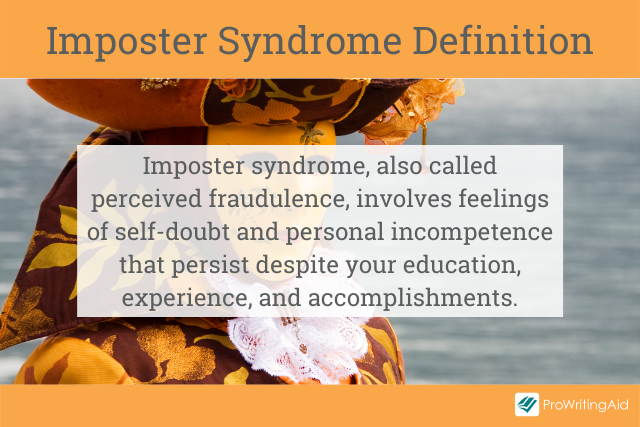
Imposter syndrome is typically accompanied by high levels of anxiety, self-sabotage, and debilitating thoughts that you are a failure or inadequate—despite evidence that shows you’re skilled and successful.
In addition to feeling like a fraud, these writers fall victim to their own internal critic and end may become susceptible to high levels of procrastination.
There are few feelings worse than never knowing what could have been, and this is true for creatives—especially writers—who withhold their work, procrastinate, fail to finish, or even can’t get started because of low self-confidence.
Imposter Syndrome and Writers
Writers are especially susceptible to experiencing this phenomena. Although sharing work is part of the job, it’s understandably unnerving to introduce your work to the general public—indeed, a fickle crowd.
First, you need to know that imposter syndrome is incredibly common and you’re not alone. So you don’t have to suffer alone.
In fact, you don’t have to suffer at all.
Imposter syndrome has probably already robbed the world of many great advances, but now it’s time to take back your power—don’t let it rob you of your chance to share your unique art with the world.
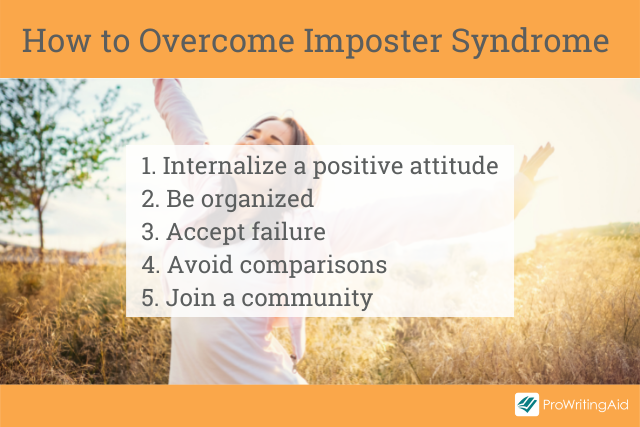
Here are a few tools and steps that will help you kick imposter syndrome to the curb and silence that inner critic.
1. Internalize a Positive Attitude
The first step is to find out where those feelings of self-doubt come from. Identify this and counter it with the positive beliefs. You can even make them into affirmations.
In maintaining a positive attitude, it can also be worthwhile to track your accomplishments. Make note of all your milestones and use them as a reminder of your skill.
Of course, an accomplishment doesn’t have to be a fancy award. Simple achievements, like making progress on your word count, should be acknowledged and celebrated.

Speak kindly to yourself and limit self-deprecating talk. Repeat as many positive affirmations as you need to regain your confidence.
2. Get Organized
In this case, your mind is already working against you, filling you with lies about what you’re capable of (newsflash, it’s a lot!).
Which is why getting organized is very important. It’s often said that your mental space can sometimes reflect your physical situation. If you are able to have a clutter-free space then your writing muse will thank you.
Being organized also includes curating a space that inspires you and putting systems in place to keep you accountable for the things you promised yourself you’d do. Understandably, the writing process can be daunting, but incorporating some simple activities in your routines can take some of the weight off.
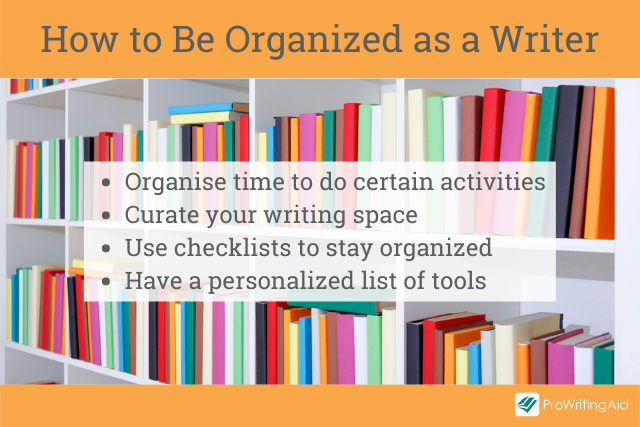
If you need help, then there are writing apps and tools that are available. Our very own ProWritingAid tool will help to streamline your processes and make more time for what actually matters—writing. Sign up a for free trial today.
While you’re at it, be sure to check out this article on some other tools than can make your writing process easier.
3. Accept Failure

Failure is a stepping stone to success. Ever heard the saying "fall seven times, rise eight"? It’s a reminder to be resilient in the face of failure.
When Jack Canfield said, "Everything you want is on the other side of fear," he wasn’t lying.
I shudder to imagine the dreams that have been stunted out of fear of failure. Even if you’re the best writer in the world, it is very unlikely that you have not encountered failure once.
In fact at some point in your life you won’t be as good as you’d like, especially for new endeavors. The key here is persistence and a willing heart to try again when you experience failure.
It’s important to get comfortable with the idea of failing. Failure has the ability to shake your perceived core identity, especially as a writer. It’s part of the writing game. Instead of giving up, work steadily to improve your craft.
I’d like to think that whenever you fail, it’s really a dress rehearsal for the big day when you finally succeed.
4. Avoid Comparisons
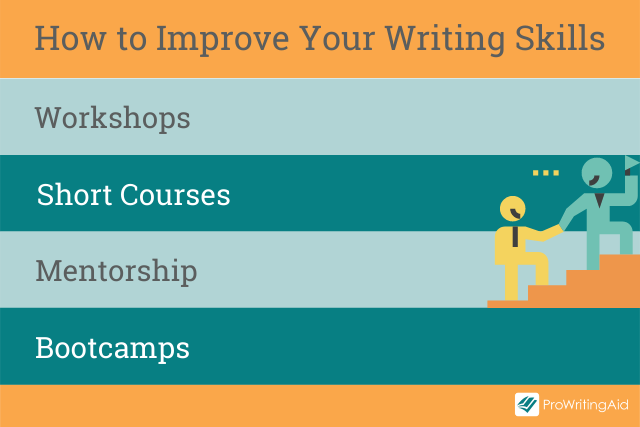
"Comparison is the thief of all joy."
It’s true when you scroll on Instagram comparing your life to a perfectly curated reel, and it’s true when you compare your writing to another’s. Especially if you’re a newbie, it’s very easy to get caught up on the progress of people who are ahead of the learning curve.
The key here is to acknowledge the jealousy, let it go, and allow it to convert to inspiration.
Think of this as a great opportunity to look at what parts of other writers’ journeys you can benefit from. Think—where do these people find inspiration from, what is their writing process like, what best practices do they use?
Strategize your own learning curve. Sign up for workshops, short courses and bootcamps. Do online tutorials, and if the opportunity presents itself, don’t be afraid to reach out to a writer that you admire.
Most importantly, in order to stave off comparisons, celebrate the stage you are at. Find your tribe, like-minded individuals who help you with your writing journey.
Which leads me to my next tip ...
5. Join a Community
There are other writers who have imposter syndrome. This means that you can find your tribe.
Experiencing a sense of community, especially with like-minded writers, is a sure way to get you out of the funk. Seeing that you’re not the only person with this particular experience can open up avenues for camaraderie and inspiration.
Community can also lead to mentorship. While you may get validation from figuring things out on your own, assistance is always needed from time to time. If you’re looking to join a community, our ProWritingAid Writer’s Community is the place to be. Immerse yourself in a safe space that is as nourishing as it is inspirational.
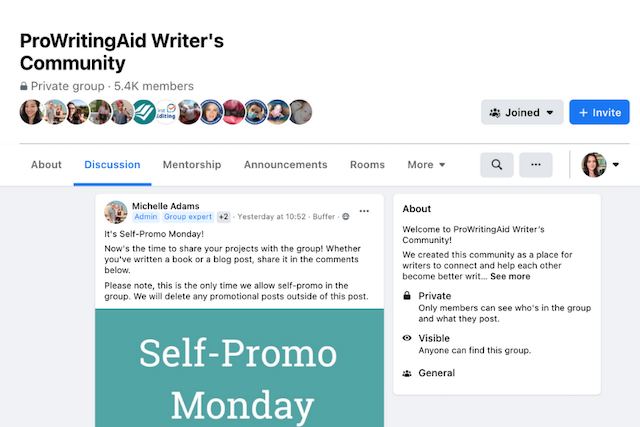
Quite literally, your one-stop to:
- Give and receive valuable feedback
- Form an accountability system
- Get help with your process
- Receive encouragement
Just a reminder: you aren’t alone, so don’t suffer alone.
Writing Is a Journey
Above all, remember to be patient with yourself. Overcoming imposter syndrome is not a one-night thing. Small, iterative steps will take you a long way. Learn to appreciate where you are on your own writing journey.
The first step is to acknowledge your negative thoughts. Then begin the process of removing your mental road blocks. Believe in the inherent value of your art and be consistent with your efforts.
You’ve got this!

